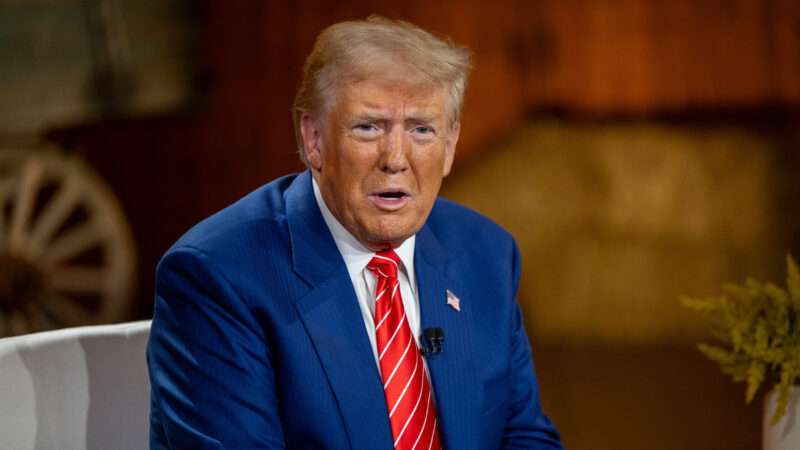
"Never before has a presidential nominee—let alone a former president—openly suggested turning the military on American citizens simply because they oppose his candidacy," New York Times reporters Lisa Lerer and Michael Gold say in a "news analysis" published on Tuesday. They are referring to former President Donald Trump's comments in a Fox News interview with Maria Bartiromo on Sunday. Yet nowhere in that interview did Trump suggest that "the military" should be deployed against American citizens "simply because they oppose his candidacy."
Bartiromo asked Trump whether he was "expecting chaos on Election Day" if "you win." Elaborating on that possibility, she mentioned "outside agitators," "50,000 Chinese nationals in this country," "people on the terrorist watch list," and "13,000 murderers"—alluding to the former president's false claim about "convicted illegal alien murderers" who supposedly "are now on the loose."
Trump's response:
I think the bigger problem is the enemy from within—not even the people that have come in and destroyed our country, by the way, totally destroying our country. The towns, the villages, they're being inundated. But I don't think they're the problem in terms of Election Day.
I think the bigger problem are the people from within. We have some very bad people. We have some sick people, radical left lunatics. And I think they're the—and it should be very easily handled by—if necessary, by [the] National Guard or, if really necessary, by the military, because they can't let that happen.
Trump's take on what might happen if he wins the election is certainly alarmist, especially since he imagines that police won't be able to handle the "chaos," requiring assistance from the National Guard or maybe even "the military." Rep. Byron Donalds (R–Fla.), a Trump ally, rightly rejected the latter suggestion in a CNN interview on Tuesday. Although it "could be appropriate" to use the National Guard, Donalds said, "obviously we don't want to have the United States military—we're not going to have that—be deployed in the United States. That's been long-standing law in our country since the founding of the republic."
Still, it is clear that Trump, contrary to the gloss offered by the Times, was talking about rioting by "radical left lunatics," as opposed to peaceful protests or other forms of dissent. But in reporting that Trump endorsed a military assault on his critics, the Times was echoing other news outlets.
"Trump suggests using military against 'enemy from within' on Election Day," a CNN headline said. The Hill described a "backlash" against Trump's "suggestion that U.S. troops could be used to go after 'radical-left lunatics' following the presidential election." Trump "wants the military used against Americans who don't support him on Election Day," Vanity Fair's Bess Levin claimed. "Trump sparks outrage after calling for army to handle enemies on election day," The Guardian reported.
"Trump suggests he'll use the military on 'the enemy from within' the U.S. if he's reelected," said the PBS headline over an Associated Press story. That one does not even superficially make sense, since Trump would not yet be president in Bartiromo's scenario. Similarly puzzling: The Times claimed Trump's comments about Election Day riots suggest he "would use the power of the presidency to crush those who disagree with him."
These misleading takes reflect the familiar tendency of Trump's most vociferous critics to exaggerate the evidence of his authoritarian instincts by quoting him out of context. That tactic is counterproductive, since it invites anyone who is even mildly skeptical to dismiss the broader case against him as fact-free hyperventilating. It is also unnecessary, since there are plenty of legitimate reasons to worry about Trump on this score.
In his interview with Bartiromo, for example, Trump invoked "the enemy from within" several times. The first reference was to the "radical left lunatics" who might cause "chaos" in response to his election. But later, after Bartiromo asked how Trump would "guard against the bureaucrats undermining you in a second term," he offered a broader definition.
"We have two enemies," Trump said. "We have the outside enemy, and then we have the enemy from within. And the enemy from within, in my opinion, is more dangerous than China, Russia, and all these countries, because if you have a smart president, he can handle them pretty easily."
As an example of "the enemy within," Trump cited Rep. Adam Schiff (D–Calif.), who managed Trump's first impeachment and is now running for the Senate. "The thing that's tougher to handle are these lunatics that we have inside, like Adam Schiff," he said. "Think of it. This guy is going to be a senator." Trump described Schiff as "a total sleazebag" who has "put our country" in "danger."
Portraying a political opponent as a traitor to his country and an "enemy within" is bad enough. There is no need to suggest that Trump, if elected, would be inclined to order a military strike on Schiff's office.
The post No, Trump Did Not Endorse a Military Assault on People 'Simply Because They Oppose His Candidacy' appeared first on Reason.com.







